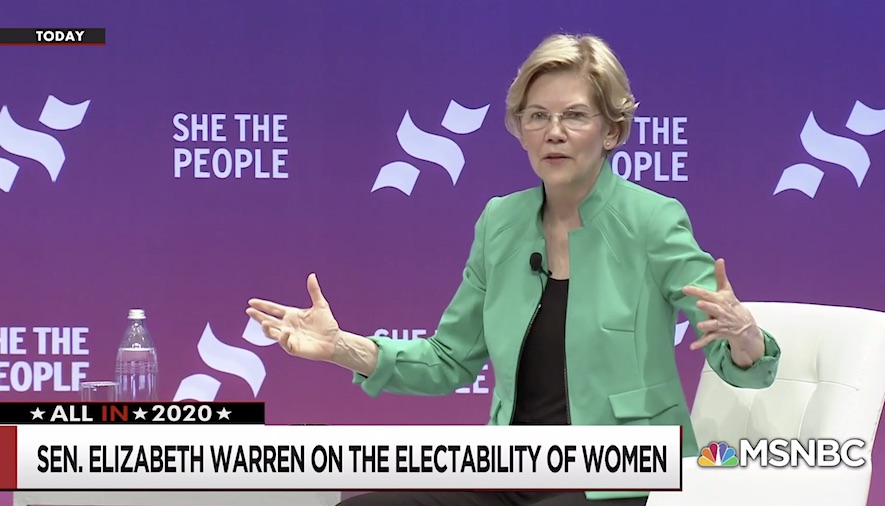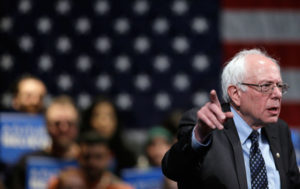This Isn’t the Election for Democrats to Play It Safe
Don’t listen to the repeated claims that a white man should emerge as the Dems’ 2020 nominee to challenge Trump. Massachusetts Sen. Elizabeth Warren talks about her family history on MSNBC's "She the People" forum in April. (MSNBC screen shot)
Massachusetts Sen. Elizabeth Warren talks about her family history on MSNBC's "She the People" forum in April. (MSNBC screen shot)
As I watched the Democratic candidates for president on television during the recent CNN town hall forum, I thought that at least one of the women among them could make an excellent nominee. I also wondered whether this election cycle may be ripe for a strong campaign led by a woman.
Sens. Elizabeth Warren, Kamala Harris and Amy Klobuchar presented as forceful and knowledgeable as they fielded questions at the April 22 event. They were every bit as impressive as Sen. Bernie Sanders and Mayor Pete Buttigieg, who were also participating in the forum. Two other women, Sen. Kirsten Gillibrand of New York and Rep. Tulsi Gabbard of Hawaii, are in the running for the Democratic nomination as well. With former Vice President Joe Biden finally entering the race, that means 20 people from the Democratic camp are now competing to challenge President Donald Trump in the 2020 presidential contest.
The winner will face a president who is damaged goods. The Mueller Report, too detailed to be forgotten or discredited, continues to chip away at Trump. Whether or not the report prompts an impeachment trial, it’s news, and neither Trump nor his team—including Fox News—can ignore it. (Actually, Trump is embracing the report. He insists that it vindicates him and keeps it at the top of the news every day.)
Some Democrats—including those who haven’t recovered from Trump’s victory—fear all of this will roll off of him and, protected by poll projections of around 35 to 40 percent support of his base, he will be re-elected. But even the most traumatized Democrats may still concede the Democratic nominee has at least a chance to beat him. That’s one reason why so many candidates are running for the party’s 2020 nomination.
It’s odd that the women among them aren’t being mentioned in the same breath as the men. That’s in part because Hillary Clinton lost to Trump in 2016, and her defeat has made the idea of a female nominee seem too improbable, to some, to merit discussion. This notion has become ingrained in the conventional wisdom consulted by the pundit- and Democratic Twitter-verses.
But improbable is a word to be avoided these days. Cornell University philosopher Kate Manne, author of “Down Girl: The Logic of Misogyny,” made this point in an April 23 interview with Vox’s Ezra Klein. Manne said, “It’s depressing watching the four B’s—Biden, Bernie, Beto and Buttigieg—rise in the polls and generate enthusiasm beyond the substance that may be there while women trail behind them with no plausible explanation for why we see that striking pattern. It is always possible it’s just due to the female candidates being less exciting, but I have a hard time believing it in this race.”
She continued, “If we knew for sure … [if] a candidate couldn’t beat Trump, that would be reason not to support them … [But] part of what makes someone unelectable is people give up on them in a way that would be premature rather than going to the mat for them.”
A Feb. 12, 2019 CNN study by political analyst Ron Brownstein, with useful graphics by Joyce Tseng, gauged favorably women’s influence among the Democratic electorate.
The study said that white women with college degrees, along with African American women representing all educational levels, could add up to two-fifths of all Democratic primary voters next year. The study also said that Democratic primary voters, including minorities, white-collar workers and women, continue to recoil from Trump.
“The solidifying dominance in the primary electorate of female voters could benefit the historic field of female contenders,” Brownstein said. “In particular, many strategists planning 2020 campaigns agree that college-educated white women and African American women are likely to emerge as the most influential constituencies in the contest.”
At this point, it’s smart to put the numbers aside, including the polls showing Biden and Sanders leading the push for the nomination. It’s too early for polling to mean much.
The quality of the candidates is what counts now. Do they come off as articulate and compelling in their speaking style? Do they have the intelligence to absorb the details of complex issues? Can they discuss them frankly in a way people will understand? Do they possess that intangible quality of charisma? Do they have the even more subtle quality of a fighting heart, the ability to withstand the buffeting of a presidential campaign and the presidency?
The female candidates meet these criteria every bit as much as do the male candidates. They vary on the details but fit into the Democrats’ typical moderate-to-liberal range, from the caution of Harris to the more militant liberalism of Warren.
It was Warren, rather any of the men, who offered one of the most electric moments of the campaign. At MSNBC’s April 24 “She the People” presidential forum, aimed at women of color, co-moderator Joy Reid stated, “A lot of women of color that say, after the experience of 2016, they don’t have the confidence in the electorate of this country to elect a female president. They want to vote one way, but their fear says that they may need to flee to the safety of a white male candidate.”
Warren responded, “How are we going to fight? Not just individually, but how are we going to fight together? Are we going to fight because we’re afraid?” The Massachusetts senator continued: “We got a room full of people here who weren’t given anything. We got a room full of people here who had to fight for what they believe in. We have a room full of people here who had to reach down deep, no matter how hard it was, no matter how scary it looked. They found what they needed to find and they brought it up and they took care of the people they loved.”
Then Warren related this to her own life, when her father was put out of work by a heart attack. She recalled a day when, as a child, she walked into her parents’ bedroom and saw her 50-year-old mother crying and preparing to face an unknown future. “She blew her nose, she put on her high heels and she walked to Sears and got a minimum wage job answering the phone,” Warren recounted. “The minimum wage job saved our home, and it saved our family.”
That’s what this presidential campaign is about—families facing economic disaster, only a paycheck or a serious illness away from poverty and homelessness. None of the men have expressed their stories with more compassion and understanding than Warren.
The other female candidates will have their moments as the campaign progresses. They deserve serious consideration. This is 2019—why not a female candidate in 2020? Why not a female president?
Your support matters…Independent journalism is under threat and overshadowed by heavily funded mainstream media.
You can help level the playing field. Become a member.
Your tax-deductible contribution keeps us digging beneath the headlines to give you thought-provoking, investigative reporting and analysis that unearths what's really happening- without compromise.
Give today to support our courageous, independent journalists.






You need to be a supporter to comment.
There are currently no responses to this article.
Be the first to respond.